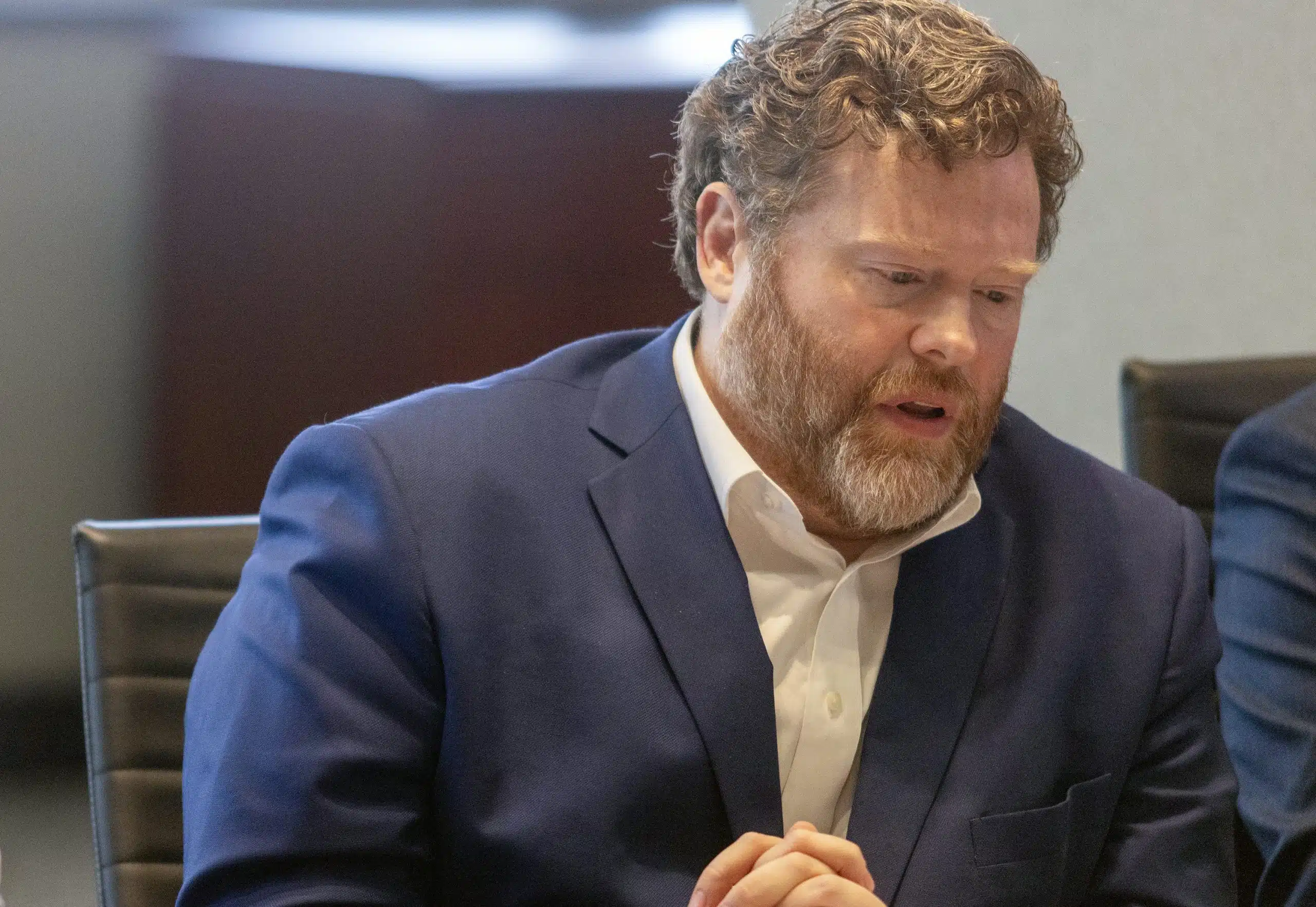Mississippi Today
Governor’s allies on advisory board thwart effort to give poor moms timely health care

The state Medicaid director and a hospital CEO — neither of them doctors — bucked recommendations from health care professionals and delayed a vote that could have made it easier for expecting Mississippians to receive timely prenatal care.
The move comes just days after the release of a maternal mortality report that shows Mississippi is still one of the most dangerous places in the country to give birth.
The Mississippi Medical Care Advisory Committee heard presentations from Dr. Anita Henderson, former president of the state pediatric association, and Dr. Jaleen Sims, a Jackson-based OB-GYN. The two said at the committee’s Friday meeting that establishing pregnancy presumptive eligibility for Medicaid could make it easier to receive timely prenatal care in Mississippi.
The committee —made up of 11 members appointed by the governor, lieutenant governor and speaker of the House — is tasked by state law to advise the Division of Medicaid, which covers most births in Mississippi. The committee’s recommendation to the state Legislature this past year to extend postpartum Medicaid coverage was influential in the legislation’s subsequent passage.
Medicaid Director Drew Snyder, appointed by former Gov. Phil Bryant and reappointed by Gov. Tate Reeves, has opposed Medicaid expansion and was reluctant to endorse expanding postpartum care to mothers despite the urging of doctors this past year, in line with Reeves. On Friday, Snyder urged the committee to hold off on recommending presumptive Medicaid eligibility for expectant mothers. Kent Nicaud, a hospital CEO who is a strong political supporter of Reeves, aided Snyder in the effort by amending a motion that would have recommended the policy’s adoption.
Pregnancy presumptive eligibility allows people to receive health care when they’re pregnant, even if they’re not on Medicaid because it’s presumed that they qualify.
It’s an important step to reducing barriers to timely care. It can be complicated to get pregnancy Medicaid coverage, and those complications can mean the difference between a preventable pregnancy-related death and a safe delivery.
Though Medicaid policy states a person can qualify by simply attesting they are pregnant, most doctors and expecting people are under the impression a pregnancy test from a health care provider is required to be covered. Sims previously told Mississippi Today that despite the division’s policy, her patients applying for Medicaid have been asked for further confirmation to verify they’re pregnant.
That means Mississippians generally must pay out-of-pocket for a doctor’s pregnancy test test because they’re not presumed eligible for Medicaid. Then they must wait for their Medicaid application to be approved to receive care, unless they’re willing to continue paying out-of-pocket. Some doctors won’t even see them before they’re insured.
The division does retroactively reimburse prenatal care after applications are approved, but Matt Westerfield, spokesperson for the Division of Medicaid, told Mississippi Today last year that it takes the agency about 24 days to approve pregnancy applications.
Following the doctors’ presentations at the committee meeting, State Health Officer Dr. Daniel Edney made a motion for the committee to recommend the adoption of pregnancy presumptive eligibility to the Legislature or the division.
“Give these women a chance to have their babies,” Edney said. “Why wouldn’t we do it if we’re in such a crisis?”
After the motion was seconded, however, Snyder spoke up in opposition.
“Twenty minutes of discussion from two presenters is not enough on this complex issue,” Snyder said. “Rather than saying, ‘Let’s do everything we can,’ let’s do what’s smart and what works and what’s actually connected to improving outcomes.”
Snyder, an attorney, asked the committee if the division could consider and research the policy and return to the committee with their findings.
Dr. Billy Long, a gastroenterologist based in Madison, then expressed confusion about who had the power to establish the policy.
“I thought I heard you say, ‘Medicaid could not make this decision,’” he said to Snyder.
Snyder replied, “That’s correct, we need to send this to the Legislature,” and then immediately declined to get into the “nuances.”
It’s not clear what agency has the power to establish presumptive eligibility. Snyder, appointed Medicaid director by former Gov. Phil Bryant and reappointed by Reeves, has said previously that the Division of Medicaid wouldn’t utilize pregnancy presumptive eligibility unless directed to by the Legislature. Westerfield previously told Mississippi Today that position is to avoid paying “providers for services for women who subsequently would not qualify for Medicaid.”
Nicaud then suggested that Medicaid bring more information to the committee at a special meeting in January and repeatedly stressed that “educating” patients might be more helpful to improving outcomes for mothers and babies in Mississippi than presumptive eligibility.
Nicaud, who also doesn’t have a medical degree, is the president and CEO of Gulfport’s Memorial Health System and has donated almost $125,000 to Reeves since 2017.
Nicaud encouraged Edney to modify his motion, which Edney declined to do.
“We endorse the concept of presumptive eligibility unless there’s a reason we cannot,” Edney said. “If there’s an extra meeting, I’d be happy to attend.”
Nicaud then amended Edney’s motion to call a special meeting to discuss presumptive eligibility further and then make the committee’s recommendation to the division or Legislature.
Following the meeting, Snyder quickly left the Capitol chamber where the meeting was held and refused to take questions.
Henderson later expressed disappointment about the committee’s decision.
“Personally, I think it’s a no brainer,” she said. “I think this is an issue everyone should be on board with. If the rest of the country is, why aren’t we?”
Mississippi is one of 21 states as of January 2020 that doesn’t offer presumptive eligibility for pregnant people, according to KFF, and Mississippi is one of just three states that has not expanded Medicaid nor established presumptive eligibility.
According to a study commissioned with the University of Mississippi Center for Population Studies by the Center for Mississippi Health Policy, preterm births are less likely for low-income people when they live in a state with presumptive eligibility and expanded Medicaid.
Sen. Kevin Blackwell, R-Southaven, and Sen. Nicole Boyd, R-Oxford, say they will co-author a bill this upcoming Legislative session about presumptive eligibility for pregnant women. A previous attempt to establish presumptive eligibility by Rep. Missy McGee, R-Hattiesburg, did not make it out of committee this past session.
This article first appeared on Mississippi Today and is republished here under a Creative Commons license.
Mississippi Today
Mississippi school superintendents indicted on fraud charges
The superintendents for Leake County and Hollandale school districts and a consultant have been indicted on four federal counts of conspiracy to commit embezzlement, theft and bribery.
According to the indictment, Earl Joe Nelson, while superintendent of Clarksdale Municipal School District and now Leake County School District, and Mario D. Willis, as superintendent of Hollandale School District, allegedly paid each other tens of thousands of dollars in school funds for consultant services that were never rendered from November 2021 until at least June 2023.
Additionally, the duo is accused of stealing U.S. Department of Education funds that were intended for their respective districts.
A St. Louis-based consultant and teacher, Moneka M. Smith-Taylor, has also been indicted on bribery charges in connection with the case. She allegedly received more than $250,000 from Willis for consulting services that were never provided over the course of two years.
She returned part of that money to Willis in the form of a cash kickback in return for the consulting contract, the indictment says.
A spokesperson for the Mississippi State Department of Education directed Mississippi Today to local school boards, who make personnel decisions for their respective districts, for comment.
The job status of the two superintendents is unclear. District officials could not be reached by presstime, but Willis is still listed as the superintendent of Hollandale School District and Nelson is still listed as the superintendent of Leake County School District in the state education department’s online directory.
It’s also unclear whether the defendants have a lawyer who could speak on their behalf.
This article first appeared on Mississippi Today and is republished here under a Creative Commons Attribution-NoDerivatives 4.0 International License.
The post Mississippi school superintendents indicted on fraud charges appeared first on mississippitoday.org
Note: The following A.I. based commentary is not part of the original article, reproduced above, but is offered in the hopes that it will promote greater media literacy and critical thinking, by making any potential bias more visible to the reader –Staff Editor.
Political Bias Rating: Centrist
The article reports on the indictment of two Mississippi school superintendents and a consultant on federal fraud charges in a straightforward, factual manner. It presents the legal allegations without editorializing or taking a stance. The language is neutral and focused on relaying verified information from the indictment and official sources, without suggesting guilt or innocence. There is no evident ideological framing or advocacy; rather, the piece sticks to reporting the details of the case and the status of the individuals involved. Thus, the article adheres to objective journalistic standards without discernible political bias.
Mississippi Today
Defendant in auditor’s ‘second largest’ embezzlement case in history goes free
Four years ago, agents from the state auditor’s office arrested Tunica nonprofit operator Mardis Jones in what the office trumpeted as the second-largest embezzlement case in its history and demanded Jones return over $1 million to the state.
The charges accused Jones of stealing $750,000 from a home rehabilitation program he was supposed to be administering while turning away needy rural residents living in crumbling houses.
But his defense attorney attacked holes in the case, and last month, a local jury found Jones not guilty of the criminal charges. Now, the state has made no indication it will bring a civil case to try to claw back the money from him.
Jones’ nonprofit Tunica County Housing Inc. secured a subcontract with the county through the North Delta Regional Housing Authority in 2014 to run the county’s home rehabilitation program funded with casino revenue. For his work, vetting applications and managing expenses, Jones earned $12,000 a month.
At the core of the criminal case were “strange money transfers” and a finding that several of the people whose applications for home rehab were approved allegedly never received any repairs to their homes. According to the auditor’s office, investigators found less than 20% of the nearly $2 million Jones’ nonprofit received went to the contractors working to rehab homes.
“Once again, an arm of government trusted a private organization to run a government program, and a large percentage of the program’s spending was flat out stolen,” State Auditor Shad White said in a press release after the arrest.
Attorney General Lynn Fitch echoed White, saying, “These funds – hundreds of thousands of dollars – were meant to help the elderly, handicapped, and poverty stricken. But the funds never got to the vulnerable citizens who needed it most.”
Jones’ lawyer Carlos Tanner explained to Mississippi Today that the program operated with an extreme backlog, and that “some of the people they were claiming didn’t get their houses done actually did” by the time the trial was held this year.
The program was poorly administered, Tanner said, meaning that even if a person’s application was approved and a rehab contract prepared, county officials could direct Jones to put someone else’s repair job ahead of his or hers.
“But just because it was run like a first weekend lemonade stand does not mean Mardis Jones stole money,” Tanner said.
Tanner said the investigators gathered paltry evidence, only looking at details that fit their narrative. While Jones did earn a large salary through his contract, Tanner said prosecutors never presented evidence that Jones converted money that was supposed to be used on home rehabilitation to his personal use.
Investigators got a warrant to seize Jones’ electronics, Tanner said, but “they never bothered to search it.”
“The two OSA (Office of the State Auditor) officials who were running the investigation, I questioned them about it during trial, and neither of them could tell me where the computer was, where the phone was, or what the contents were,” Tanner said.
Jacob Walters, a spokesperson for the auditor’s office, defended the way the investigators handled the case, saying, “The state auditor’s office is never going to turn a case we investigated over to a prosecutor unless we’re fully confident in the work that we did.”
At the time the auditor’s office announced the Jones arrest, it also said it delivered a demand letter ordering Jones to repay over $1 million, the money it alleged he stole plus interest and investigative expenses.
It’s up to the attorney general or local district attorney to decide how to prosecute auditor investigations, or in Jones’ case, what happens to the civil demand now that a jury found him not guilty in the criminal case.
When a person receives a demand alongside his or her arrest, regardless of what happens with criminal charges, the claw back can be enforced through civil litigation — much like the case against several defendants in a stunning Mississippi Department of Human Services fraud case, which began in 2020 and has yet to be resolved. Walters said the demand against Jones is still the office’s next-largest in history, second only to the welfare scandal.
The government might choose to pursue civil litigation, even if criminal prosecution is unsuccessful, because there is a lower burden of proof to win civil cases.
But the attorney general’s office told Mississippi Today last month that it had not received the Jones demand letter from the auditor, meaning it has nothing left to enforce.
Walters said the auditor’s office sent the letter along with the case file four years ago, but that with a turnover in attorneys prosecuting the case, the auditor had to resend the file last year. If the attorney general’s office no longer possesses the demand document, Walters said, “it’s an incredibly easy problem to resolve.”
“Just reach out to us with a single phone call or email and we can get it to you,” Walters said.
After the interview, the auditor’s office sent the demand letter by email, and the attorney general’s office confirmed it was received.
This article first appeared on Mississippi Today and is republished here under a Creative Commons Attribution-NoDerivatives 4.0 International License.
The post Defendant in auditor’s ‘second largest’ embezzlement case in history goes free appeared first on mississippitoday.org
Note: The following A.I. based commentary is not part of the original article, reproduced above, but is offered in the hopes that it will promote greater media literacy and critical thinking, by making any potential bias more visible to the reader –Staff Editor.
Political Bias Rating: Centrist
This article presents a factual and balanced account of the embezzlement case involving Mardis Jones without overt ideological framing. It reports statements from both government officials criticizing the alleged misconduct and the defense attorney’s rebuttals, highlighting weaknesses in the prosecution’s case. The tone remains neutral, avoiding partisan language or loaded terms. It focuses on the procedural aspects, jury verdict, and potential civil actions without advocating for a political viewpoint. The article provides context from multiple perspectives, adhering to objective reporting rather than promoting a specific ideological stance.
Mississippi Today
JPD called ICE on Miss. father, who faces deportation
Kerlin Moreno-Orellana is facing deportation over a misdemeanor charge that usually results in a fine. He was picked up by Immigration and Custom Enforcement agents on Thursday morning and transferred from the Raymond Detention Center to an ICE detention center in Louisiana.
On June 16, Jackson police arrested Moreno-Orellana, a contractor, in south Jackson along with his employer Christy Parker, who was showing him one of the old properties she worked on. Both were charged with illegal dumping, but Parker claims they did not dump anything.
After detaining them, Jackson police called a local TV outlet, 16 WAPT News, to come shoot the scene of the arrest. Parker said they were kept in the police car for over an hour, waiting for the news crew. The WAPT newsroom explained that the Jackson police routinely asks them to cover arrests related to illegal dumping or other high profile cases, in order to “dissuade people.”
Once at the station, the Jackson Police Department called ICE on the 35-year-old father of four, who had worker authorization documents. He was kept in jail overnight, while Parker was released hours after their arrest.
“He didn’t do anything I didn’t do,” Parker said in an interview with Mississippi Today. “But because I’m white, I’m here?”
A municipal court ordered Moreno-Orellana’s release the day after, but ICE placed a detainer on him – a formal request to keep a non-citizen in custody for 48 hours, while the agency investigates. It is not an arrest warrant. However, a state law passed in 2016 mandates that all local law enforcement comply with ICE detainers placed on undocumented immigrants.
“What we are doing today is no different than what we’ve always operated when the detainer is sent by ICE to the jail,” said Hinds County Sheriff Tyree Jones. “Nothing has changed.”
While the Hinds County Sheriff’s Department has historically worked with ICE, Jackson police actively seeking out ICE to detain people is a fairly recent occurrence, said Mississippi-based immigration attorney Jeremy Litton. Jackson police did not respond to a request for comment.
ICE picked up Moreno-Orellana with hours left on his detainer, and he now faces deportation. ICE spokesperson Lindsay Williams said that Moreno-Orellana violated the conditions of a past bond agreement by being arrested for a new charge. He had already spent over a month in ICE custody in 2019, after getting arrested by park rangers for speeding and driving without a license.
Still, a minor misdemeanor charge – like illegal dumping – is normally insufficient for ICE to threaten to deport someone with worker authorization paperwork. Removal of a person with documentation is usually justified if the person is deemed a threat to public safety or national security.
“This does feel like a result of the elevated focus on deporting people from the Trump administration,” said Matt Steffey, professor at the Mississippi College School of Law.
Moreno-Orellana, who is from Honduras, has three boys and a girl, the youngest of whom is less than a year old. He has lived in Mississippi for over 16 years. Colleagues describe him as a valuable worker and a good friend.
“All he ever did was work and go home,” Parker said. “He was always willing to give somebody help.”
The possibility of his deportation is leaving his family in a precarious situation. Moreno-Orellana was the sole breadwinner of the family, and his wife worries about sustaining herself and their children without him.
“I’ve always dedicated myself to taking care of my kids at home, and he’s the one who brings food to the table,” his wife said in Spanish. “I’m afraid of staying, being without my children’s father. Not so much for me, but because they need him.”
This article first appeared on Mississippi Today and is republished here under a Creative Commons Attribution-NoDerivatives 4.0 International License.
The post JPD called ICE on Miss. father, who faces deportation appeared first on mississippitoday.org
Note: The following A.I. based commentary is not part of the original article, reproduced above, but is offered in the hopes that it will promote greater media literacy and critical thinking, by making any potential bias more visible to the reader –Staff Editor.
Political Bias Rating: Center-Left
This article primarily reports on the actions of law enforcement and ICE with a focus on the human impact of deportation on a Mississippi family. While the reporting remains factual, the framing and choice of quotes highlight concerns about racial disparities, immigration enforcement policies, and potential overreach by authorities, suggesting a subtle critical tone toward current immigration enforcement practices. The article’s emphasis on the family’s hardship and the legal nuances involved positions it slightly left-of-center, sympathetic to immigrant rights and critical of aggressive ICE actions. However, it avoids overt ideological language, maintaining largely balanced coverage.
-
News from the South - Tennessee News Feed6 days ago
Thieves take thousands of dollars in equipment from Union County Soccer League
-
Mississippi Today4 days ago
Defendant in auditor’s ‘second largest’ embezzlement case in history goes free
-
News from the South - Texas News Feed6 days ago
Robert Nichols to retire from Texas Senate
-
News from the South - Louisiana News Feed6 days ago
3 lawsuits filed against CVS, Louisiana AG announces
-
News from the South - Missouri News Feed6 days ago
Residents provide feedback in Kearney Street Corridor redevelopment meeting
-
News from the South - Alabama News Feed6 days ago
News 5 NOW at 12:30pm | June 24, 2025
-
The Conversation6 days ago
The Vera C. Rubin Observatory will help astronomers investigate dark matter, continuing the legacy of its pioneering namesake
-
News from the South - Texas News Feed5 days ago
The Rio Grande Valley as Heart of LGBTQ+ Resistance and Joy




















































